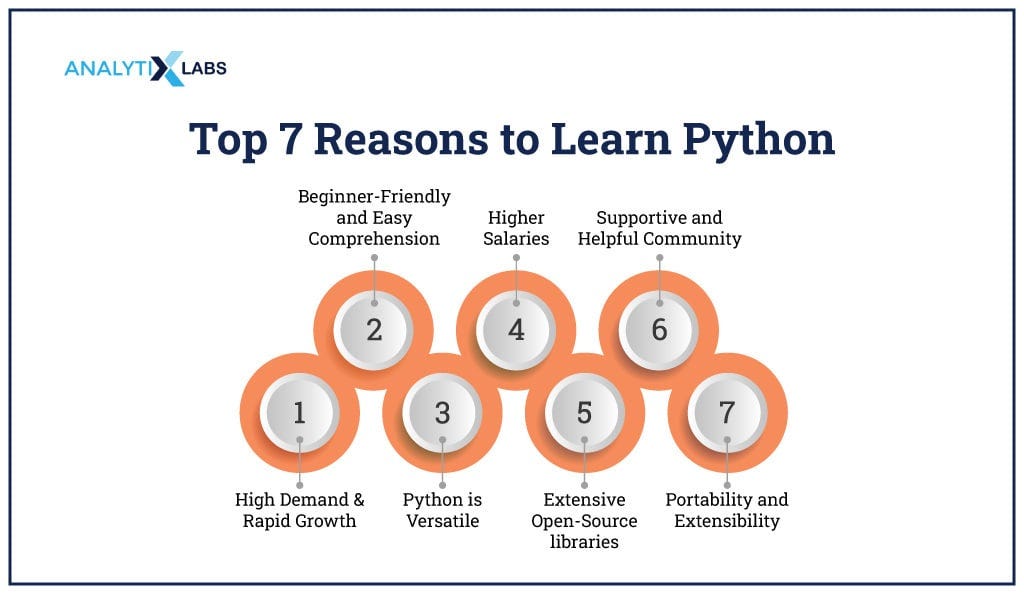
### Why You Should Begin Learning Python Today
Are you searching for a method to boost your productivity or enjoy some programming? Enter Python—not the reptile, but the immensely popular programming language. Whether you are an absolute novice or an experienced developer, Python offers an essential toolkit that can transform the way you handle data, automate processes, or even delve into the growing realms of Artificial Intelligence (AI) and Machine Learning (ML). In this article, we will discuss why Python is rapidly becoming a critical skill in various sectors and why you ought to start mastering it today.
—
### 1. **Python Is Fast and Simple to Learn**
One of Python’s key advantages is its user-friendliness. The language features a straightforward syntax that resembles natural language, making it exceedingly approachable for beginners. In contrast to other programming languages that entail convoluted lines of code, Python enables developers to complete tasks quickly while keeping the code readable.
Consider this straightforward program to display the message “Hello World”:
#### Written in Java:
“`java
public class Greeting {
public static void main(String[] args) {
System.out.println(“Hello World!”);
}
}
“`
#### Written in Python:
“`python
print(“Hello World!”)
“`
Even to those unfamiliar with coding, it’s clear which snippet is simpler: Python reduces boilerplate code, allowing you to concentrate on resolving real-world challenges more rapidly.
However, simplicity does not equate to a lack of capability—Python remains highly versatile and is utilized in various fields including web development, data science, artificial intelligence, automation, and beyond. It’s no surprise that both industry leaders and enthusiasts consider Python a premier programming language.
—
### 2. **Python’s Impact Across Sectors**
Python’s charm lies in its exceptional flexibility and its ability to seamlessly adapt to different domains. Let’s take a look at some of the sectors that depend heavily on Python and why it continues to thrive:
#### **Web Development**
Python supports strong backend development for websites and applications. Frameworks such as Django and Flask streamline the creation of scalable, high-performance web applications. In fact, leading companies like Netflix, Spotify, Google, and Instagram leverage Python to drive everything from user interfaces to data pipelines.
Netflix, for example, appreciates Python’s expansive developer community and comprehensive library offerings, which aid in expediting development while fostering creativity. Django’s frameworks, encompassing vital functionalities such as authentication, form validation, and file uploads, further amplify Python’s capability in building feature-rich, contemporary websites.
#### **Data Analytics and Mining**
Data is the valuable asset of the 21st century. Python equips analysts with libraries like Pandas and NumPy, empowering them to manage vast datasets with ease. These instruments can convert complex datasets into understandable insights presented in tables, graphs, or visual formats.
Moreover, Python is widely utilized for web scraping—gathering data from the internet. For example, libraries like Scrapy and BeautifulSoup assist analysts in collecting and mining data on consumer behavior, market dynamics, or public sentiment analysis. Imagine a business utilizing Python to analyze Twitter data to assess public opinion on its products—this provides invaluable insights for effective business strategies.
Here’s an example in Python:
“`python
import tweepy
# Authentication details
consumer_key = “your_key”
consumer_secret = “your_secret”
access_token = “your_token”
access_token_secret = “your_token_secret”
# Configuring Tweepy and retrieving data
auth = tweepy.OAuthHandler(consumer_key, consumer_secret)
auth.set_access_token(access_token, access_token_secret)
api = tweepy.API(auth)
query = “Python”
language = “en”
tweets = api.search(q=query, lang=language)
for tweet in tweets:
print(tweet.user.screen_name, “Tweeted:”, tweet.text)
“`
This code snippet, integrated with Twitter’s API, enables companies to uncover critical real-world sentiment data—an efficient process achieved in just a few steps.
#### **Artificial Intelligence (AI) and Machine Learning (ML)**
Python stands out in the burgeoning fields of AI and ML. Here’s why:
– Frameworks such as TensorFlow, PyTorch, and Keras facilitate algorithm development.
– Python’s organized data libraries allow for swift handling and manipulation of datasets.
– Its platform agnosticism means projects can run smoothly across different operating systems like Linux, Windows, or Mac.
Consider AI-driven systems such as Siri or Alexa: Python often plays a foundational role in developing algorithms that simulate human behavior and enhance user interaction. Its ease of deployment and abundant community resources guarantee Python’s ongoing importance as a key player in AI innovations.
—
### 3. **Promising Career Prospects**
Python’s relevance across various fields guarantees a bright career outlook for developers. Whether you are eager to work for tech giants such as Google, Facebook, or IBM, or venture into advanced areas like neural networks and cryptocurrency, Python serves as a robust foundation.
As per Stack Overflow’s